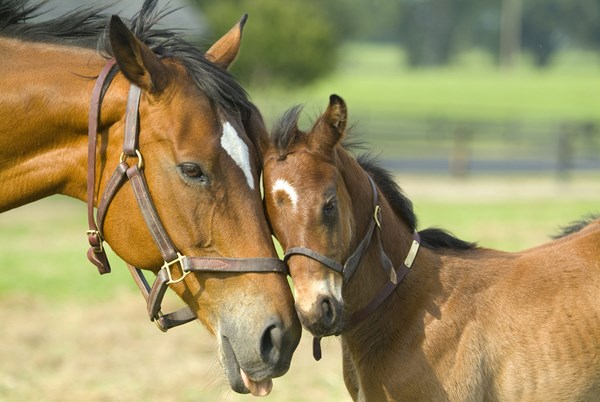 Credit: Thinkstock While iodine deficiency is the primary cause of goiter in foals, excessive levels of iodine may also cause this condition.
Credit: Thinkstock While iodine deficiency is the primary cause of goiter in foals, excessive levels of iodine may also cause this condition.Iodine is an essential nutrient for reproduction and normal physiological function in the horse. Thyroxine (T4) contains iodine and this hormone, along with triiodothyronine (T3), has powerful effects on the horse’s overall health. These substances influence nearly every process in the body, from heat regulation and feed utilization to proper bone growth and maturation. The role in reproductive health is also important, and in mares that do not ovulate on a regular cycle, supplementation with iodine has produced a positive response.
Nearly 75% of the iodine in an animal’s body is in the thyroid gland. Iodine deficiency may result in goiter as the thyroid becomes enlarged in an attempt to produce adequate levels of thyroxine. In the horse, goiters often occur in the foal at birth. Foal goiter may result from a deficiency in iodine in the mare’s ration during pregnancy or it may be caused by a goitrogenic substance. Symptoms of iodine deficiency may be a stillborn foal or a very weak foal that cannot stand and nurse. The foal may also have a rough hair coat, contracted tendons, angular limb deformities or other abnormal bone development.
While iodine deficiency is the primary cause of goiter in foals, excessive levels of iodine may also cause this condition. The horses most sensitive to high iodine levels are foals from mares that are supplemented with high levels of iodine. Iodine is concentrated across the placenta and in milk so that the fetus and nursing foal receive much higher concentrations than are present in the mare’s ration. Therefore, goiters may be present in newborn foals while sparing the mother.
Most commercial horse feeds are formulated to contain an adequate amount of iodine. Toxic dietary iodine concentrations may result from adding excessive supplemental iodine. This mineral is present in ethylenediamindihydroiodide (EDDI), a substance sometimes added to feedstuffs. Some types of kelp also contain excess iodine is kelp. For horse owners who want to feed seaweed to their horses, there are numerous other specific seaweeds, including Fucaceae, Palmariaceae, Gigartinaceae, Bangiaceae and Ulvaceae, that contain considerably less iodine than kelp.
Visit equinews.com/newsletters to subscribe to The Weekly Feed, KER’s award-winning equine nutrition newsletter.


